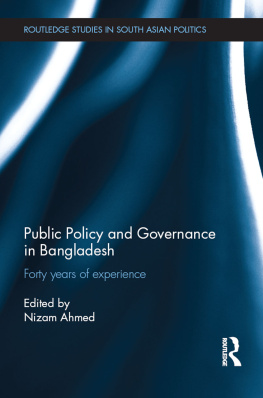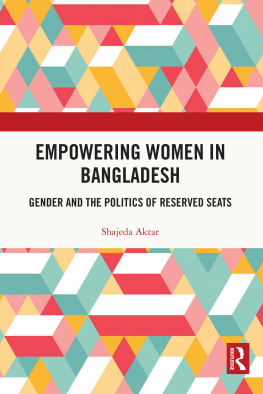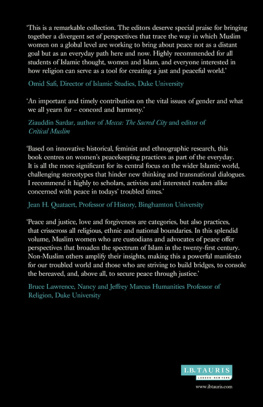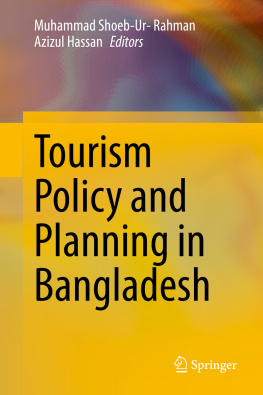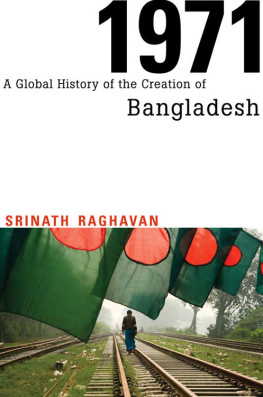Published by State University of New York Press, Albany
2015 State University of New York
All rights reserved
Printed in the United States of America
No part of this book may be used or reproduced in any manner whatsoever without written permission. No part of this book may be stored in a retrieval system or transmitted in any form or by any means including electronic, electrostatic, magnetic tape, mechanical, photocopying, recording, or otherwise without the prior permission in writing of the publisher.
For information, contact State University of New York Press, Albany, NY
www.sunypress.edu
Production, Jenn Bennett
Marketing, Michael Campochiaro
Library of Congress Cataloging-in-Publication Data
Mannan, Manzurul.
BRAC, global policy language, and women in Bangladesh : transformation and manipulation / Manzurul Mannan.
pages cm
Includes bibliographical references and index.
ISBN 978-1-4384-5783-3 (hardcover : alk. paper) ISBN 978-1-4384-5785-7 (e-book) 1. BRAC (Organization) 2. Rural developmentSocial aspectsBangladesh. 3. Non-governmental organizationsBangladesh. 4. WomenBangladeshSocial conditions. I. Title.
HN690.6.Z9C63825 2015
307.1412095492dc23
2014041452
10 9 8 7 6 5 4 3 2 1
I dedicate the book to my late parents Tahera Begum and Abdul Mannan
Acknowledgments
W hile this book is based in part on personal experience, the fullness of that experience has necessarily been shaped by many persons experiences and ideas and through collaboration. I first conceived the idea of this book 1989 when, as student of anthropology in Bergen University in Norway, I met Sir F. H. Abed, the founder of BRAC, during a conference on South Asia. At that point, I was hardly aware of BRAC or NGOs, but severe criticism of BRAC in the conference, particularly by Indian and Sri Lankan Marxist scholars, piqued my interest in the organization. This interest led to my induction into BRAC when I joined in its Research and Evaluation Division in 1993. During my engagement with BRAC and other NGOs, I realized that BRACs impact was much higher than any other NGOs, yet a critical look at this famous NGO was missing. This book, then, stands not so much as a criticism of BRAC, but as a critical review.
Because this book is modified version of my PhD thesis, I am deeply grateful to those who have aided me through the books various incarnations. My heartfelt gratitude goes to my supervisor, Professor Paul Sillitoe, for his help and encouragement throughout my fieldwork, thesis work, and the writing of this book. He helped me shape my discrete ideas into a concrete perspective. Dr. Dorothy Middleton acted in many ways as my mentor, and Professor Michael Carrithers and Dr. Tamara Kohn were a great help in clarifying my methodology. The comments of Dr. Andrew J. Russell and Dr. Joseph Devine encouraged me to convert my thesis into a book. I also thank Dr. Leslie Jessop and Dr. Peter Dixon for many useful discussions. Also, Mrs. Kate Payne and Mrs. Pat Barbers sound administrative support made my life comfortable during my stay at Durham University, UK.
This book could never have been published without the congenial, stimulating intellectual milieu at the Independent University, Bangladesh. The late Vice Chancellor Professor Bazlul Mobin Chowdhurys moral support was enormous; he released me from my teaching responsibilities so that I could complete my dissertation and book. Professor Mufakharul Islam persistently encouraged me so that I did not lose the focus of project. Professor Nazrul Islam helped me in various ways to complete my thesis by allowing me time off from my other departmental tasks. I am grateful, also, to Dr. Mahbub Alam, Nazir Ahmed, Dr. Akimun Rahman for providing me intellectual input toward the completion of book. My gratitude also extends to my students: Md. Sharfuddin Tanmoy and Unaiza Harris meticulously checked and crosschecked the bibliography of the book, and Faisal Sarker and Tarif Sharafi undertook the task of drawing diagrams for the book. I am in debt to my colleague Nabil Ahmed in Paris, France, who took keen interest the project, provided me intellectual support, and literally went through the entire book to make comments, corrections, and clarifications to make the book coherent.
Many ex- and present staff members from BRAC provided critical input. I will always cherish the memory of the late Rafiqul Islam at the Training Division, who proved instrumental in developing my insight into BRAC. I am grateful also to Dr. AMR Chowdhury and Dr. Imran Matin, who gave me permission to do research into BRACs organization, in spite of their knowing my critical position. Others, who wish to remain anonymous, provided me with an insight into the various problems that BRAC faces in carrying out its work. Their support proved invaluable.
I owe much to late Professor Muzzafar Ahmed as discussions with him enabled me to articulate the theme of the book. I wish also to extend my heartfelt gratitude to Professor Tajul Islam Hashmi, Professor Peter Bertocci, Dr. Hossain Jillur Rahaman, and Dr. Lamia Karim. Professor Yung Chun deserves special appreciation as he created the opportunity for me to teach at the South Asian Studies Programme in the National University of Singapore (NUS). I benefited immensely from the resources at the NUS library, which so enriched the content of the book.
I could not have completed my fieldwork and the writing of the book without the unfailing support and encouragement so willingly provided by my family and relatives. In particular, my wife Konima Parvin took over my family duties, so as to afford me needed time to complete the book. My son Saiyudh Mannan and daughter Naina Mannan always cheered me on to complete the book. My brothers Zafrul Mannan and Azharul Mannan and my nephew Saad Mannan, too, were always enthusiastic about my project, but it was sister-in-law Zennat Mannan who made my life comfortable while I was in the United Kingdom. My friendsKhondokar Shakhawat Ali, Shah Alam, Anis Parvez, and Dr. Shaduzzaman, to name a fewwere continuous sources of inspiration, as we always discussed various points of view. My offer special thanks to Dr. Ishtiaq Jamil of Norway, who never hesitated in bringing me the latest books and publications from Europe.
I am deeply grateful to Michael Helme and Jacqueline Pagani for copyediting several chapters. My thanks also go to Dr. Michael Rinella, senior acquisitions editor at SUNY Press, for his support in making the publication of this book possible. Additionally, I express my gratitude to the three anonymous reviewers for their comments on the manuscript, which gave the book its final shape.
Many others, too numerous to mention individually, provided me with essential knowledge and insight into the development industry in Bangladesh, without which this book could never have been completed.
Last, but not least, I offer deep gratitude to my spiritual leader, the late Shayak Ziaul Huq, and to Shayak Syed Mohammad Hasan of Maijbhandar, Chittagong, who provided much-needed moral support.




